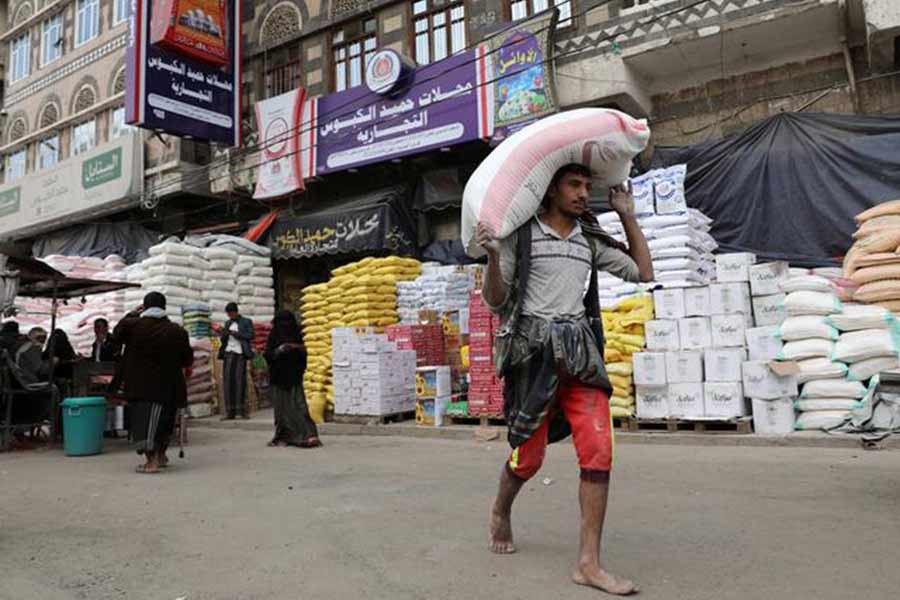
Published :
Updated :

Since 2015, the United States (US) has been assisting a military coalition led by Saudi Arabia and the United Arab Emirates (UAE) which is at war with Yemen's Iran-backed Houthi rebels. The coalition's declared aim is to restore the government of President Abdrabbuh Mansur Hadi who the Houthis overthrew in 2014. The US supports the coalition with intelligence sharing, targeting assistance, arms sales, spare parts for coalition warplanes, and (until November 2018) in-flight refuelling of coalition aircraft.
In addition to air attacks, the Saudi-led coalition conducts a land, sea, and air blockade on Yemen. The coalition says that the blockade's purpose is to interdict weapons shipments from Iran to the Houthis. The coalition justifies the blockade as enforcement of the arms embargo on Yemen established in UN Security Council Resolution 2216 (2015). Paragraph 15 of UNSCR 2216, according to Reuters news service, allows "Yemen-bound vessels [to] be inspected if there were 'reasonable grounds' to suspect they were carrying arms." (Notably, UNSCR 2216 condemns "aggression by the Houthis," but says nothing about Saudi and Emirati aggression.)
The UN has called Yemen "the world's worst humanitarian crisis." Even before the war and blockade, Yemen was the Arab world's poorest country. Today, Yemen is on the brink of famine with most of its 28 million people relying on scanty humanitarian aid to survive. The UN calls Yemen "the world's worst humanitarian crisis."
Yemen is desperately short of fuel oil that it needs to power electrical generators in hospitals and to transport food and medicine once they reach Yemen from the outside world. CNN senior correspondent Nima Elbagir reports seeing "hundreds" of trucks stranded along the highway to the port of Hodeidah, full of food which is spoiling because there is no fuel for the trucks.
Fourteen tankers laden with fuel for Yemen are being detained by Saudi Arabia off the Saudi coast. Not a single fuel ship has been allowed to dock at Hodeidah since December. The once bustling port has become in Elbagir's words, a "ghost town."
The coalition detains ships for periods up to 100 days. Some ships are never allowed into Yemen. Sometimes the coalition releases a ship only after extorting a bribe.
BLOCKADE AND CEASEFIRE: It does not take 100 days to search a ship for weapons, particularly ships which have already been cleared by the UN Verification and Inspection Mechanism for Yemen (UNVIM). The coalition has instituted the blockade as part of a deliberate strategy to use starvation as a weapon of war against Yemen's population. Historically, Yemen has imported 80 per cent of its food. Kamel Jendoubi, Chair of the UN Group of Experts on Yemen, reported to the Security Council in December that "Civilians in Yemen are not starving; they're being starved by the parties to the conflict." Coalition airstrikes on March 22 hit a Houthi-controlled grains port at Salif on the Red Sea Coast.
In his first major foreign policy speech as president on February 4, Joe Biden promised to end US support for "offensive operations" in Yemen, "including relevant arms sales." Biden did not mention the blockade and it remains a mystery whether the administration regards the blockade as an "offensive operation." According to CNN, the US "has not however publicly rescinded its support for the Saudi blockade," according to CNN.
The Houthis have said that they will not agree to a ceasefire until the coalition blockade is lifted. Early in March, President Joe Biden's special envoy to Yemen Tim Lenderking presented the Houthis with what Lenderking describes as a "sound plan" for a ceasefire. Lenderking is coy as to the contents of the plan, but from media reports it does not seem that the proposal includes lifting the blockade. Unsurprisingly, the Houthis have not responded to the US proposal.
Then on March 22, the Saudis released a peace plan which includes provisions for a ceasefire and for lifting the blockade. In reply, the Houthi Foreign Affairs Minister said that the blockade must be lifted first before the Houthis would enter into peace talks. The day after the Saudi proposal, the Houthis launched a drone attack on an airport in southern Saudi Arabia. The attack provides further proof of what the Houthis think of the Saudi proposal.
The blockade needs to be lifted at once, with or without a ceasefire. There is no telling how long it will take to achieve a ceasefire. While it works to reach a ceasefire, the Biden Administration must condemn the blockade and pressure the Saudis and Emiratis to lift it at once.
Charles Pierson is a lawyer and a member of the Pittsburgh Anti-Drone Warfare Coalition. The piece is excerpted from www.countrepunch.org


 For all latest news, follow The Financial Express Google News channel.
For all latest news, follow The Financial Express Google News channel.